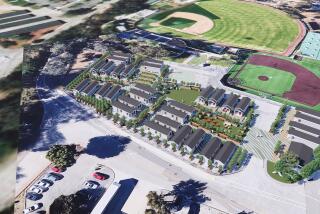Housing Plan Offers Hope for Veterans
- Share via
There are not many monuments to hope on the tattered, desperate streets of downtown Los Angeles’ skid row.
But on a dusty block of Fifth Street, at the corner of San Julian Street, where misery is often palpable, a modest symbol of renewal is rising. The 100-year-old Southern Hotel, gutted, with its bones on display like a clanky skeleton, is still mostly in shambles.
But taking shape are 55 rooms that will house homeless veterans in need of as much rehabilitation as the hotel itself. The Southern will be the first single-room housing development designed primarily for veterans in downtown Los Angeles, said Charles “Bud” Hayes, executive director of Single Room Occupancy Housing Corp., the private, nonprofit development group that is revamping the hotel.
It is scheduled to be completed and to begin accepting tenants in November or December, he said. Funding for the $2.1-million project is from government and private partners.
The need for such facilities is compelling. Nationally, a third of the homeless men who are seeking shelter are veterans, many of them combat veterans from the Vietnam and Persian Gulf wars, according to surveys of rescue missions.
Los Angeles County has the largest concentration in the nation, advocates say. Ninety percent of them are thought to have substance abuse problems.
The Southern will provide services for recovering substance abusers and also for those with mental illnesses and disabilities. In their leases, residents will have to promise to maintain sobriety on and off the premises or be evicted. Part of the agreement includes regular testing for drug and alcohol use.
But they also will be offered rental assistance in the form of housing vouchers and long-term treatment that will include counseling and workshops. The rooms will rent for $455 a month but, with the vouchers, most tenants will pay only a third of that. Many of the services will be provided in conjunction with the Veterans Affairs Department, which operates an outpatient clinic near skid row on Temple Street.
“We need to concentrate more of our services on the downtown area, because that is where many of the homeless vets are,” said Stephen Berman, director of community care for the VA’s greater Los Angeles district. “We have transitional housing facilities, but the Southern Hotel will provide high quality, permanent housing and we are very supportive of that.”
Many features of the Southern’s rehabilitation were suggested by an informal advisory group of veterans, said Vera Fleischman, the Single Room corporation’s director of housing development.
A Chance for Independent Living
“They were particularly concerned about having a lot of open space and everyone wanted the balcony,” Fleischman said.
They also were thrilled that designs include a private bathroom in each room--almost none of the aging single-room hotels on skid row now have private baths. Other novel features include kitchens on each of the residence’s three floors and rooms that open onto breezeways, facing a tree-lined courtyard rather than a dark interior hallway.
Many veterans living downtown, including Larry Thompson, already are eyeing the Southern’s construction site enviously.
“This building represents more independent living than what is available in many of the other hotels,” said Thompson, 59, a Vietnam War veteran who has lived downtown for two years.
Thompson said he ran a successful men’s hairstyling business that had been in the family for years but began having nightmares and blackouts--classic symptoms of post-traumatic stress disorder.
His condition is under control now, but he has been unable to find steady work. He lives on a monthly $221 welfare check and food stamps. There are so many others like him, former brothers in arms who can’t escape the wars’ horrors and share the same problems, he said.
Deborah Grizzard, clinical manager of the VA’s Los Angeles Ambulatory Care Center downtown, said post-traumatic stress disorder is a persistent condition of many homeless veterans living on skid row. Many suffer multiple problems, such as chronic medical and mental health illnesses. There also is a high incidence of tuberculosis and HIV/AIDS infection.
“One of the main goals downtown is to infuse some preventive care,” Grizzard said. “If we can get a homeless person to relative health, then we can work on maintaining that.”
Another veteran, Richard Evans, 37, a former Navy radioman who served in the Persian Gulf conflict and in Bosnia, said he hopes to move into the Southern from a nearby rooming house. He sees the new facility as a place for vets to more actively support each other.
“Right now, we’re scattered in hotels throughout downtown,” said Evans, a recovering drug abuser who gives lectures to other vets about his experiences. “This will provide more structure and allow us to help each other out more.”
Part of the Southern’s mission is to encourage the self-reliance of its tenants. Residents will elect a Tenant Advisory Council and will meet monthly to discuss hotel policies and resolve disputes.
Amenities will include weekly distribution of fresh produce, a monthly meal and birthday celebration, with food supplied by the corporation and prepared by tenants, and tickets to sporting events and cultural activities.
More to Read
Sign up for Essential California
The most important California stories and recommendations in your inbox every morning.
You may occasionally receive promotional content from the Los Angeles Times.











